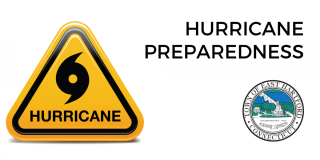Hurricane Henri Preparedness

There is a strong possibility that Tropical Storm/Hurricane Henri will impact Connecticut this weekend with strong winds, potentially flooding rain and power outages. The East Hartford Health Department would like to remind residents to take the following precautions in regards to carbon monoxide prevention, food safety, and preparing an emergency water supply. Preparing now can help keep you and your family safe.
Take Action
- To prevent carbon monoxide poisoning, use generators, pressure washers, grills, and similar items outdoors only.
- Identify and throw away food that may not be safe to eat.
- In hot weather, stay cool and drink plenty of fluids to prevent heat-related illness.
- Avoid downed power lines, if a power line falls on a car, you should stay inside the vehicle.
Carbon Monoxide Prevention
Portable back-up generators produce the poison gas carbon monoxide (CO). CO is an odorless, colorless gas that kills without warning. It claims the lives of hundreds of people every year and makes thousands more ill. Follow these steps to keep your family safe.
- Never use a generator inside your home or garage, even if doors and windows are open.
- Only use generators outside, more than 20 feet away from your home, doors, and windows.
- When using a generator, use a battery-powered or battery backup CO detector in your home.
- Do not use portable flameless chemical heaters indoors.
- Never use a gas range or oven for heating. Using a gas range or oven for heating can cause a buildup of CO inside your home, cabin, or camper.
- Never burn charcoal indoors. Burning charcoal – red, gray, black, or white – gives off CO.
- Never use a portable gas camp stove indoors. Using a gas camp stove indoors can cause CO to build up inside your home, cabin, or camper.
Food Safety
If the power is out for less than 4 hours, then the food in your refrigerator and freezer will be safe to consume. Perishable foods (such as meat, fish, eggs, milk, and leftovers) in your refrigerator should be thrown away when the power is out for 4 hours or more. When in doubt, throw it out. While the power is out, keep the refrigerator and freezer doors closed as much as possible to keep food cold for longer. Visit Keep Food and Water Safe After a Disaster or Emergency for more information.
How to Store Emergency Food
- When storing food, it is not necessary to buy dehydrated or other types of emergency food.
- Check the expiration dates on canned foods and dry mixes. Home-canned food usually needs to be thrown out after a year.
- Use and replace food before its expiration date.
- Certain storage conditions can enhance the shelf life of canned or dried foods. The ideal location is a cool, dry, dark place. The best temperature is 40° to 70°F.
- Store foods away from ranges or refrigerator exhausts. Heat causes many foods to spoil more quickly.
- Store food away from petroleum products, such as gasoline, oil, paints, and solvents. Some food products absorb their smell.
Prepare an Emergency Water Supply
- Store at least 1 gallon of water per day for each person and each pet. Consider storing more water than this for hot climates, for pregnant women, and for people who are sick.
- Store at least a 3-day supply of water for each person and each pet. Try to store a 2-week supply if possible.
- Unopened, commercially bottled water is the safest and most reliable emergency water supply.
- If you prepared stored water yourself, use of food-grade water storage containers is recommended. Visit Food and Water Needs: Preparing for a Disaster or Emergency for more information about water container cleaning and storage.

